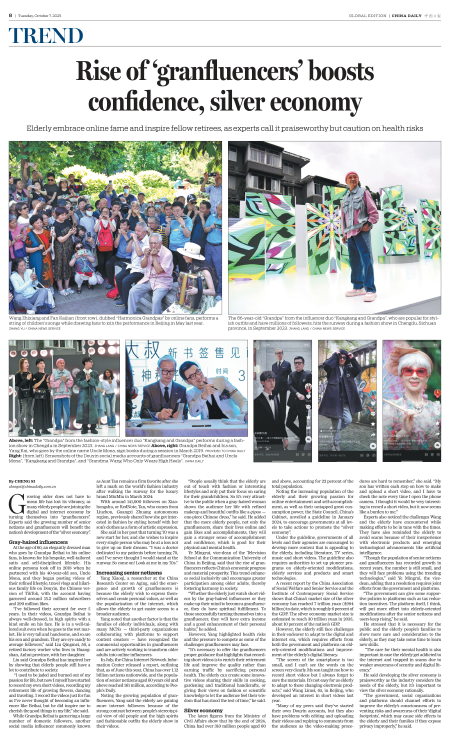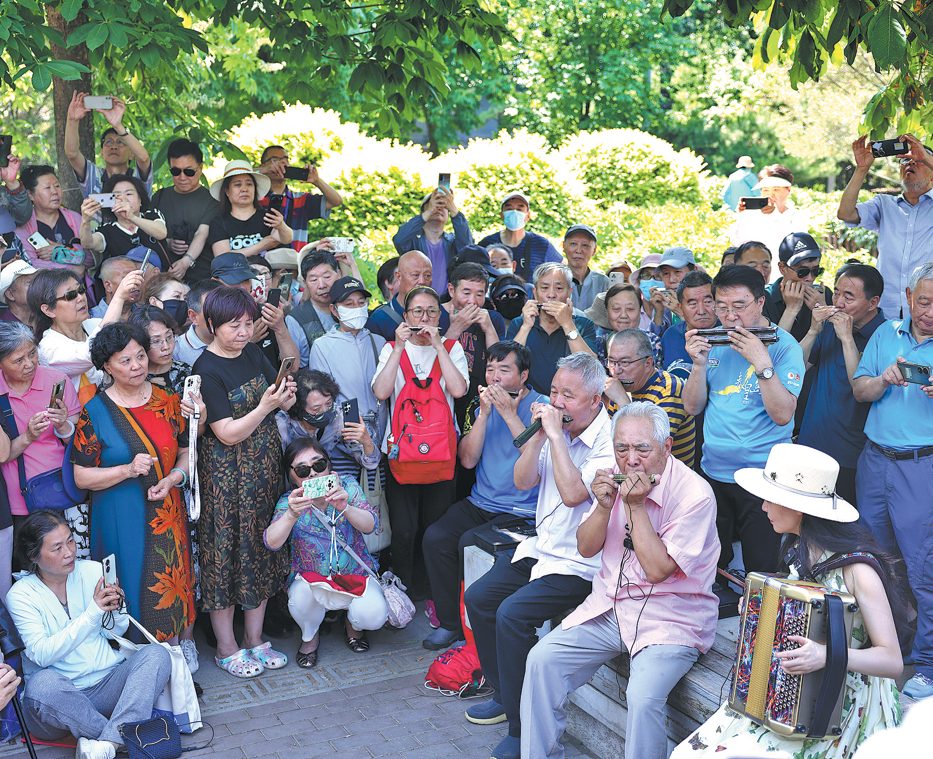
Wang Zhixiang and Fan Kaijian (front row), dubbed "Harmonica Grandpas" by online fans, performs a string of children's songs while drawing fans to join the performance in Beijing in May last year.
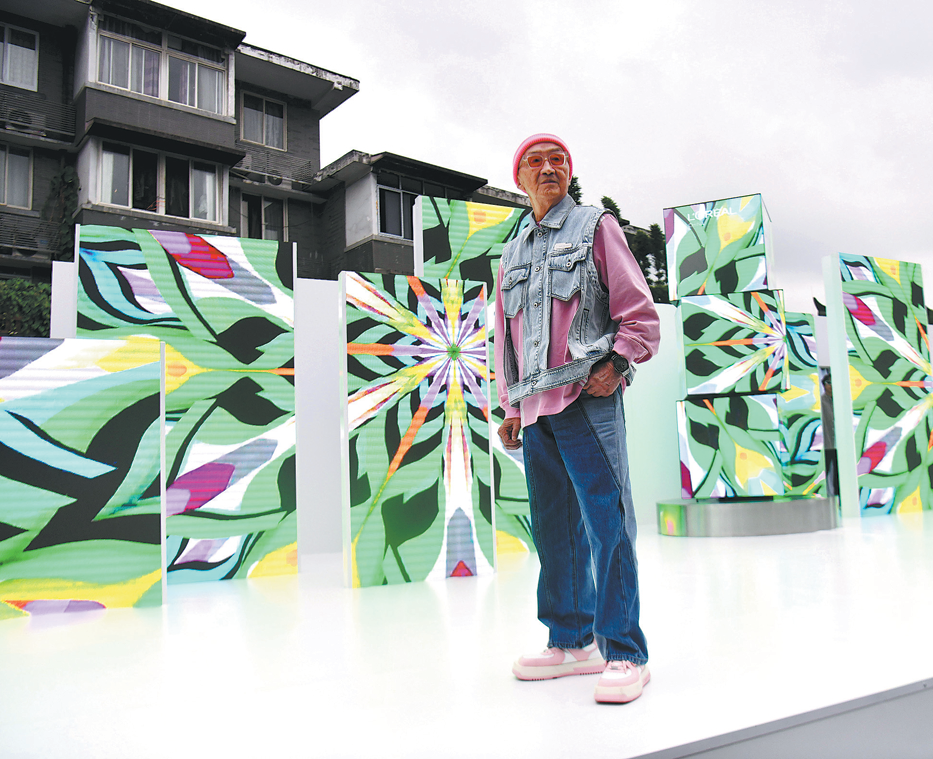
The 86-year-old "Grandpa" from the influencer duo "Kangkang and Grandpa", who are popular for stylish outfits and have millions of followers, hits the runway during a fashion show in Chengdu, Sichuan province, in September 2023.
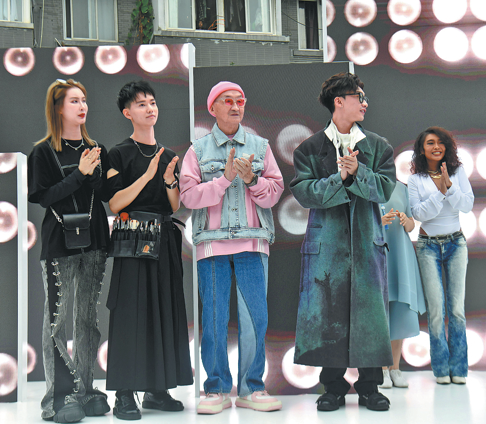
The "Grandpa" from the fashion-style influencer duo "Kangkang and Grandpa" performs during a fashion show in Chengdu in September 2023.
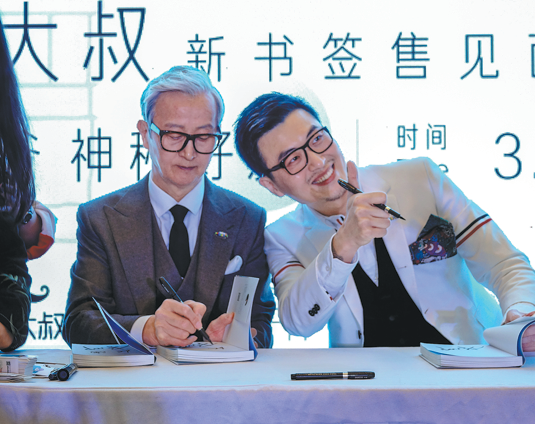
Grandpa Beihai and his son, Yang Kai, who goes by the online name Uncle Mona, sign books during a session in March 2019.
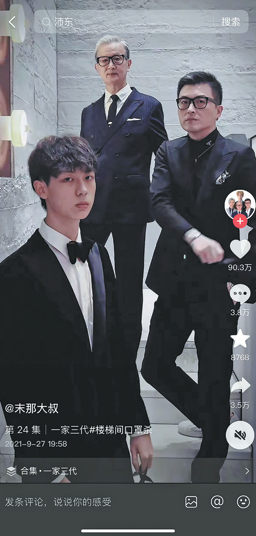
(From left) Screenshots of the Douyin social media accounts of granfluencers "Grandpa Beihai and Uncle Mona", "Kangkang and Grandpa", and "Grandma Wang Who Only Wears High Heels".
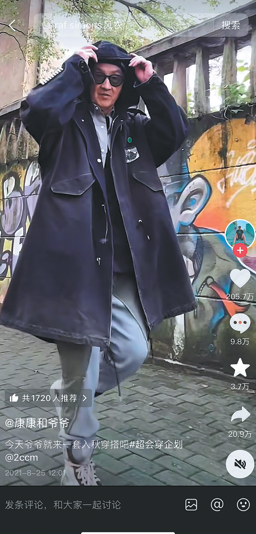
(From left) Screenshots of the Douyin social media accounts of granfluencers "Grandpa Beihai and Uncle Mona", "Kangkang and Grandpa", and "Grandma Wang Who Only Wears High Heels".
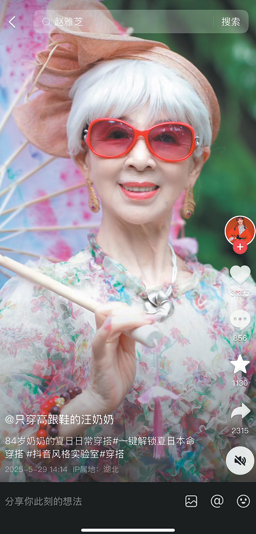
(From left) Screenshots of the Douyin social media accounts of granfluencers "Grandpa Beihai and Uncle Mona", "Kangkang and Grandpa", and "Grandma Wang Who Only Wears High Heels".
Growing older does not have to mean life has lost its vibrancy, as many elderly people are joining the digital and internet economy by turning themselves into "granfluencers".Experts said the growing number of senior netizens and granfluencers will benefit the nation's development of the "silver economy".
Gray-haired influencers
At the age of 80, an elegantly dressed man who goes by Grandpa Beihai to his online fans, is known for his bespoke, well-tailored suits and self-disciplined lifestyle. His online persona took off in 2018 when he partnered with his 40-year-old son, Uncle Mona, and they began posting videos of their refined lifestyle, travel vlogs and hilarious family life on Douyin, the Chinese version of TikTok, with the account having garnered around 15.2 million subscribers and 290 million likes.
"I've followed their account for over 5 years. In their videos, Grandpa Beihai is always well-dressed, in high spirits with a kind smile on his face. He is in a well-tailored suit even when he goes to the wet market. He is very tall and handsome, and so are his son and grandson. They are eye candy to average followers," said Liu Qingmei, 56, a retired factory worker who lives in Huangshan, Anhui province, with her daughter.
Liu said Grandpa Beihai has inspired her by showing that elderly people still have a lot to contribute to society.
"I used to be jaded and burned out of my passion for life, but now I myself have started to record my own short videos, recording my retirement life of growing flowers, dancing and traveling. I record the videos just for fun as I've never thought of becoming an influencer like Beihai, but he did inspire me to cherish the good things in my life," she said.
While Grandpa Beihai is garnering a large number of domestic followers, another social media influencer commonly known as Aunt Tan remains a firm favorite after she left a mark on the world's fashion industry after walking the runway for the luxury brand MiuMiu in March 2024.
With around 141,000 followers on Xiaohongshu, or RedNote, Tan, who comes from Liuzhou, Guangxi Zhuang autonomous region, previously shared how she got interested in fashion by styling herself with her son's clothes as a form of artistic expression.
She said in her post that turning 70 was a new start for her, and she wishes to inspire every single person who may be at a loss not to give up on their dreams. "I was a doctor dedicated to my patients before turning 70, and I've never thought I would stand at the runway. So come on! Look at me in my 70s."
Increasing senior netizens
Yang Xiaoqi, a researcher at the China Research Center on Aging, said the emergence and growth of granfluencers is because the elderly wish to express themselves and create personal values, as well as the popularization of the internet, which allows the elderly to get easier access to a broader audience.
Yang noted that another factor is that the families of elderly individuals, along with many MCNs — third-party organizations collaborating with platforms to support content creators — have recognized the commercial opportunities in granfluencers and are actively working to transform older adults into online influencers.
In July, the China Internet Network Information Center released a report, outlining that, as of June this year, China has over 1.12 billion netizens nationwide, and the population of senior netizens aged 60 years old and above reached 161 million, according to People's Daily.
Noting the growing population of granfluencers, Yang said the elderly are gaining more internet followers because of the strong contrast between people's stereotypical view of old people and the high spirits and fashionable outfits the elderly show in their videos.
"People usually think that the elderly are out of touch with fashion or interesting lifestyles and only put their focus on caring for their grandchildren. So it's very attractive to the public when a gray-haired woman shows the audience her life with refined makeup and beautiful outfits like a qipao — one-piece Chinese dress," he said. He added that the more elderly people, not only the granfluencers, share their lives online and gain likes and accomplishments, they will gain a stronger sense of accomplishment and confidence, which is good for their physical and mental health.
Ye Mingrui, vice-dean of the Television School at the Communication University of China in Beijing, said that the rise of granfluencers reflects China's economic progress and material prosperity. This trend enhances social inclusivity and encourages greater participation among older adults, thereby fostering harmony in society.
"Whether the elderly just watch short videos by the gray-haired influencers or they make up their mind to become a granfluencer, they do have spiritual fulfillment. To those successfully turning themselves into a granfluencer, they will have extra income and a good enhancement of their personal habits," he added.
However, Yang highlighted health risks and the pressure to compete as some of the challenges granfluencers may face.
"It's necessary to offer the granfluencers proper guidance that highlights that recording short videos is to enrich their retirement life and improve the quality rather than earning traffic by sacrificing personal health. The elderly can create some innovative videos sharing their skills in cooking, gardening and traditional handicrafts, or giving their views on fashion or scientific knowledge to let the audience feel their wisdom that has stood the test of time," he said.
Silver economy
The latest figures from the Ministry of Civil Affairs show that by the end of 2024, China had over 310 million people aged 60 and above, accounting for 22 percent of the total population.
Noting the increasing population of the elderly and their growing passion for online entertainment and self-accomplishment, as well as their untapped great consumption power, the State Council, China's Cabinet, unveiled a guideline in January 2024, to encourage governments at all levels to take actions to promote the "silver economy".
Under the guideline, governments of all levels and their agencies are encouraged to develop more content that is appealing to the elderly, including literature, TV series, music and short videos. The guideline also requires authorities to set up pioneer programs on elderly-oriented modifications, elderly services and products and smart technologies.
A recent report by the China Association of Social Welfare and Senior Service and the Institute of Contemporary Social Service shows that China's market size of the silver economy has reached 7 trillion yuan ($984 billion) to date, which is roughly 6 percent of the GDP. The silver economy market size is estimated to reach 30 trillion yuan in 2035, about 10 percent of the nation's GDP.
However, the elderly still face challenges in their endeavor to adapt to the digital and internet era, which requires efforts from both the government and platforms on elderly-oriented modifications and improvement of the elderly's digital literacy.
"The screen of the smartphone is too small, and I can't see the words on the screen very clearly. My son taught me how to record short videos but I always forget to save the materials. It's not easy for us elderly to adapt to these changing electronic products," said Wang Limei, 65, in Beijing, who developed an interest in short videos last year.
"Many of my peers said they've started their own Douyin accounts, but they also have problems with editing and uploading their videos and replying to comments from the audience as the video-making procedures are hard to remember," she said. "My son has written each step on how to make and upload a short video, and I have to check the note every time I open the phone camera. I thought it would be very interesting to record a short video, but it now seems like a burden to me."
Experts also noticed the challenges Wang and the elderly have encountered while making efforts to be in tune with the times. They have also reminded the elderly to avoid scams because of their inexperience with electronic products and emerging technological advancements like artificial intelligence.
"Though the population of senior netizens and granfluencers has recorded growth in recent years, the number is still small, and they will face problems using the trending technologies," said Ye Mingrui, the vice-dean, adding that a resolution requires joint efforts from the government and platforms.
"The government can give some supportive policies to platforms such as tax reduction incentives. The platform itself, I think, will put more effort into elderly-oriented modifications after the senior netizens and users keep rising," he said.
He stressed that it is necessary for the public and the elderly people's families to show more care and consideration to the elderly, as they may take some time to learn new skills.
"The care for their mental health is also important in case the elderly get addicted to the internet and trapped in scams due to weaker awareness of security and digital literacy."
He said developing the silver economy is praiseworthy as the industry considers the needs of the elderly, but it's important to view the silver economy rationally.
"The government, social organizations and platforms should channel efforts to improve the elderly's consciousness of preventing risks and awareness of their 'digital footprints', which may cause side effects to the elderly and their families if they expose privacy improperly," he said.
chengsi@chinadaily.com.cn
